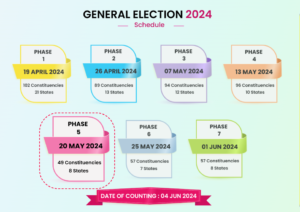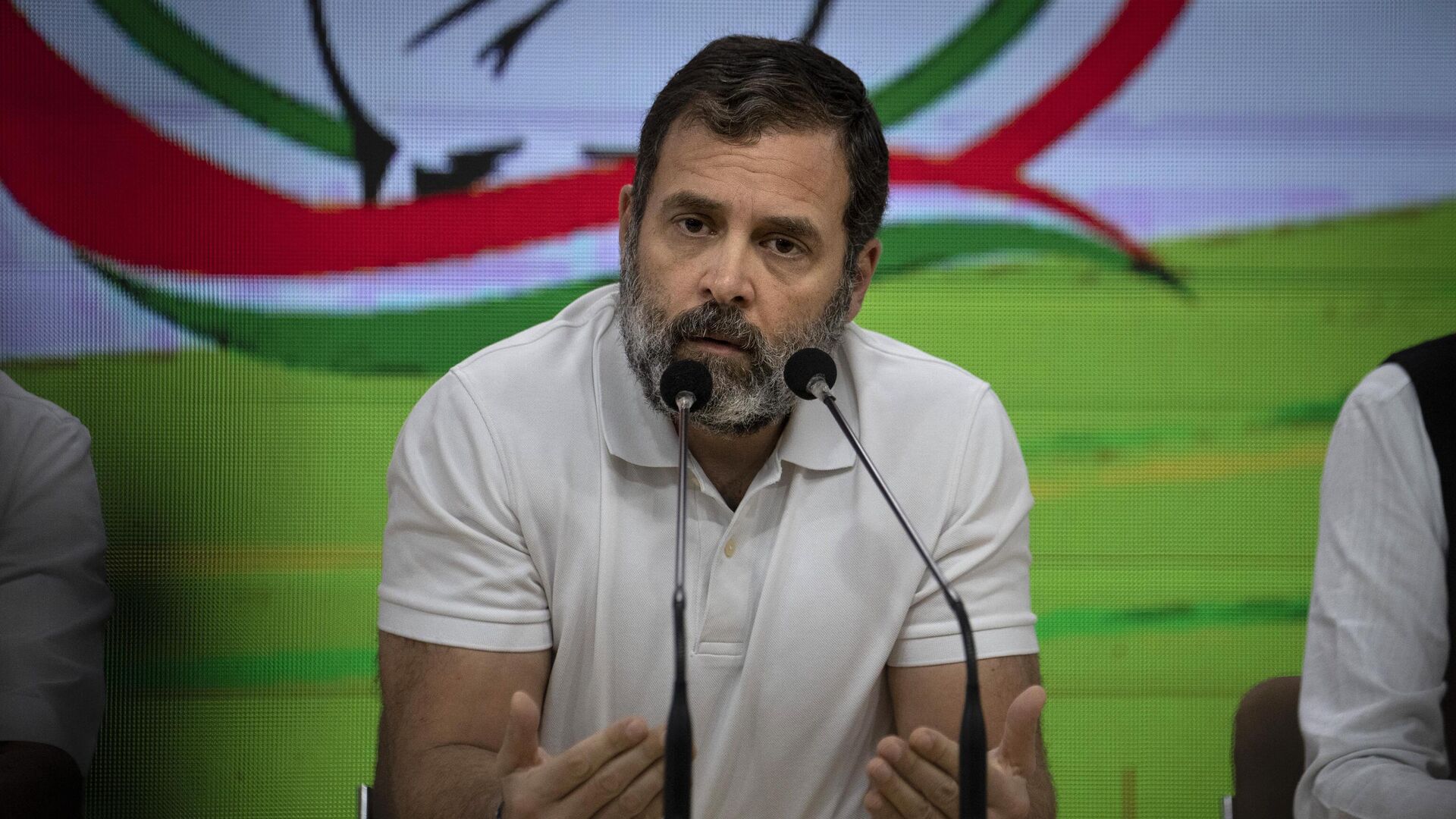Indian General Election 2024 is a significant political event currently underway, with voting taking place in multiple phases. This election will determine the composition of the 543 seats in the Lok Sabha and is being conducted in seven phases from April 19 to June 1, 2024. The results will be announced on June 4, 2024.
This is the largest-ever election in history, surpassing the previous one, and lasting 44 days. This election is notable not only for its size but also for its duration, as it spans over 44 days, making it the second longest after the 1951–52 general election. The incumbent Prime Minister Narendra Modi, who has completed two terms, is running for a third consecutive term. Approximately 970 million people out of a population of 1.4 billion are eligible to vote, accounting for 70% of the total population. Simultaneously, legislative assembly elections are being held in Andhra Pradesh, Arunachal Pradesh, Odisha, and Sikkim, along with by-elections for 25 constituencies across 12 legislative assemblies.
The Bharatiya Janata Party (BJP), led by Prime Minister Narendra Modi, is seeking to retain power, aiming for a larger mandate than in the 2019 elections where they secured 303 seats. The party’s strategy includes attempting to make inroads into southern states, traditionally less favourable to the BJP due to different socio-political dynamics compared to northern India.
Key battlegrounds include various constituencies across states like Uttar Pradesh, Kerala, Karnataka, and Tamil Nadu. For example, high-profile contests are happening in constituencies like Wayanad, where Congress leader Rahul Gandhi is running, and Thiruvananthapuram, where Shashi Tharoor seeks re-election.
Key Dates and Phrases For General Elections 2024
This extended schedule of 44 days ensures that the Election Commission of India can efficiently manage the logistics, security, and electoral processes across the diverse and vast country. Here are the key dates and details for each phase:
The election phases cover different states on specific dates:
- Phase 1 (April 19): Includes states like Arunachal Pradesh, Assam, Bihar, Chhattisgarh, Madhya Pradesh, Maharashtra, Manipur, Meghalaya, Mizoram, Nagaland, Rajasthan, Sikkim, Tamil Nadu, Tripura, Uttar Pradesh, Uttarakhand, West Bengal, Andaman and Nicobar Islands, Jammu and Kashmir, Lakshadweep and Puducherry.
- Phase 2 (April 26): Covers states including Assam, Bihar, Chhattisgarh, Karnataka, Kerala, Madhya Pradesh, Maharashtra, Manipur, Rajasthan, Tripura, Uttar Pradesh, West Bengal, Jammu and Kashmir.
- Phase 3 (May 7): Features states like Assam, Bihar, Chhattisgarh, Goa, Gujarat, Karnataka, Madhya Pradesh, Maharashtra, Uttar Pradesh, West Bengal, Dadra and Nagar Haveli and Daman and Diu, Jammu and Kashmir.
- Phase 4 (May 13): Includes Andhra Pradesh, Bihar, Jharkhand, Madhya Pradesh, Maharashtra, Odisha, Telangana, Uttar Pradesh, West Bengal, Jammu and Kashmir.
- Phase 5 (May 20): Includes Bihar, Jharkhand, Maharashtra, Odisha, Uttar Pradesh, West Bengal, Jammu and Kashmir and Ladakh.
- Phase 6 (May 25): Covers states like Bihar, Haryana, Jharkhand, Odisha, Uttar Pradesh, West Bengal and Delhi.
- Phase 7 (June 1): Features states including Bihar, Himachal Pradesh, Jharkhand, Odisha, Punjab, Uttar Pradesh, West Bengal and Chandigarh.

The Electoral Process
The election is being conducted in seven phases from April 19 to June 1, 2024. This phased approach allows the Election Commission of India (ECI) to manage the logistics and security challenges across India’s diverse and vast landscape effectively. These phases are strategically planned to ensure smooth and efficient voting, accommodating regional festivals, exams, and local events to maximize voter turnout and minimize disruptions.
Logistics and Preparations
Organizing the general elections in India involves immense logistical planning and coordination. Key preparations include:
- Polling Stations: Over 1 million polling stations are set up across urban and rural areas, including remote and inaccessible regions.
- Electronic Voting Machines (EVMs): EVMs are deployed to ensure accurate and efficient voting. Voter-verified paper audit trails (VVPATs) accompany EVMs for added transparency.
- Voter Education and Registration: Extensive campaigns are conducted to educate voters about the process and ensure they are registered. The ECI uses various media platforms to disseminate information.
- Training of Election Personnel: Millions of personnel, including polling officers, security staff, and volunteers, are trained to manage the polling stations and ensure the smooth conduct of the elections.
Security Measures
The ECI, in coordination with central and state security agencies, implements robust security measures:
- Deployment of Security Forces: Central Armed Police Forces (CAPFs) and state police are deployed in large numbers to ensure peace and order. Sensitive and vulnerable areas receive additional security.
- Monitoring and Surveillance: Advanced technology, including CCTV cameras and drones, is used to monitor polling stations and surrounding areas. Live webcasting from sensitive booths is also conducted.
- Anti-Intimidation Measures: Special measures are taken to prevent voter intimidation and ensure free and fair voting, particularly in regions with a history of electoral violence.
- Coordination with Local Authorities: Continuous coordination with local administrative and law enforcement agencies ensures that potential threats are identified and mitigated promptly.
Major Political Parties and Leaders
Bharatiya Janata Party (BJP) and Narendra Modi
The Bharatiya Janata Party (BJP), led by current Prime Minister Narendra Modi, is the ruling party in India and is seeking a third consecutive term in the 2024 general elections. Founded in 1980, the BJP emerged from the earlier Bharatiya Jana Sangh and has been heavily influenced by the Rashtriya Swayamsevak Sangh (RSS), a right-wing Hindu nationalist organization.
PM Narendra Modi, a lifelong member of the RSS, has been a prominent figure in Indian politics, serving as the Chief Minister of Gujarat before becoming Prime Minister in 2014. His administration has focused on economic development, national security, and Hindu nationalism, while also being critiqued for its handling of social issues and democratic institutions.
Indian National Congress and Rahul Gandhi

The Indian National Congress (INC), India’s oldest political party, has a storied history dating back to its founding in 1885. The party has played a crucial role in India’s independence movement and has governed the country for much of its post-independence history. Rahul Gandhi, a scion of the Nehru-Gandhi family, is one of the key figures in the party and a major contender in the 2024 elections. Despite stepping down as party president after the 2019 election defeat, he remains a central figure in the Congress-led opposition alliance, known as the Indian National Developmental Inclusive Alliance (INDIA). The Congress is focusing on issues like unemployment, rural distress, and social inequality in its campaign.
Regional Parties and Key Figures
Regional parties play a significant role in India’s political landscape, especially in states where national parties have less influence. Some of the key regional players in the 2024 elections include:
- Aam Aadmi Party (AAP): Led by Arvind Kejriwal, AAP governs the Delhi National Capital Territory and Punjab. It emerged from the anti-corruption movement and focuses on issues like education, health, and governance.
- Trinamool Congress (TMC): Led by Mamata Banerjee, the TMC is a dominant force in West Bengal. Banerjee is a vocal critic of the BJP and is positioning herself as a significant opposition leader.
- Dravida Munnetra Kazhagam (DMK): Based in Tamil Nadu and led by M.K. Stalin, the DMK is a key player in southern Indian politics, advocating for regional autonomy and social justice.
- Nationalist Congress Party (NCP): Led by Sharad Pawar, the NCP is influential in Maharashtra and forms part of the opposition alliance.
Continued in Part II of this Article.
Also Read: Election Commission orders IT Ministry to stop ‘Vikisit Bharat’ message immediately
